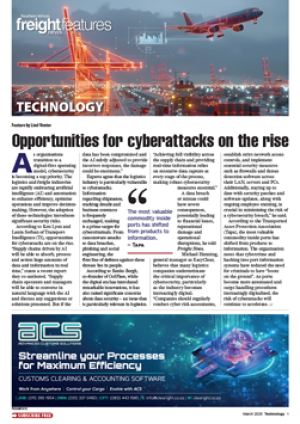Five countries singled out for 2007 kick-off
ALAN PEAT
AFTER THE phenomenal success of the electronic, airline passenger-booking (e-ticketing) initiative, the global airline body, the International Air Transport Association (Iata), is now two-years down the road with a similar concept for airfreight. The Iata “e-freight” project is designed to eliminate the need to produce and transport paper documents for air cargo shipments – and move to a simpler, industry-wide, electronic, paper-free environment. Right at the beginning, the body made it clear that it’s not entirely “paperless”. Unlike passengers, the air cargo logistics chain requires a paper chase including all the airlines, freight agents, landside transporters, other associated service industries AND customs authorities in every country involved in the freight move. “Paper-free, therefore,” said Iata, “can be defined as an environment in which industry does not need to transport paper in parallel with the freight – BUT there may be a requirement to produce this paper in original, copy or printed e-document form for some authority or process.” But it will get close to the wondrous “paperless” environment – and that will provide the air cargo industry and authorities with a host of benefits. In each year’s 40-million individual air cargo shipments, it would eliminate, for example, the average of 38 documents required per shipment – at a paper production and processing cost, Iata estimates, of about R227. The body also reckoned that the paper presently used in processing shipments every year could fill 39 Boeing 747-400 “jumbo” freighters. “These paper-based processes are not cost effective, nor do they serve the pressing needs for security and speed that are the key characteristics of air cargo,” said Iata. “A 100% simpler, electronic, paper-free air cargo shipping system will save the industry the equivalent of about R9-billion a year.” The aim is to see e-freight dominating the global stage by 2010. Working up to this, an industry action group has been formed – including airlines, top freight forwarders (represented by the association, Freight Forwarders International) and the World Customs Organisation (WCO). Together with Iata, this group will align industry stakeholders and help drive the project forward. In the implementation of the scheme, Iata has allocated e-freight pilot projects to a MINIMUM of five countries – Sweden, Australia, Canada, Singapore and Hong Kong – scheduled for 2007 kick-off. But other countries which feel they are ready can also slot into that first wave of participants, and into the second wave – which currently includes SA, USA, New Zealand, European Union (EU) and Korea. These are defined by Iata as having “governments with active customs modernisation programmes and defined delivery timelines” – and will also be into e-freight before 2010. Last in line are all other countries without defined timelines in the 3rd wave. “But,” said Iata, “this is a dynamic categorisation and will be updated by continuous review. “The project also will work towards delivering more than five countries in the 1st wave by always including governments that meet the qualification criteria as they emerge.” Paper-free air cargo movement is just round the corner.
Paper-free cargo movement could save R9bn a year
06 Dec 2006 - by Staff reporter
0 Comments
Electronic Solutions 2006
06 Dec 2006
06 Dec 2006
06 Dec 2006
06 Dec 2006
06 Dec 2006
06 Dec 2006
06 Dec 2006
06 Dec 2006
Border Beat
Featured Jobs
New
